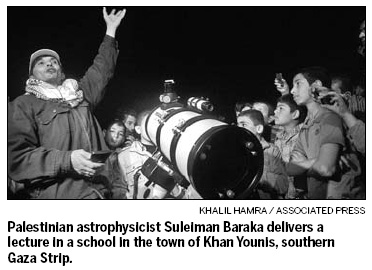-
News >World
'Beautiful universe ... no borders, no fences, no wall'
2010-03-29 08:55KHAN YOUNIS, Gaza Strip - Suleiman Baraka's journey could be measured in light years: the eldest of 14 children of a butcher, he rose from humble beginnings in violence-wracked Gaza to become an astrophysicist, space weather expert and researcher for NASA, the US space agency.

Now, at 45, he is back home with a new mission: to teach kids to look up from their blockaded, beaten-down surroundings and into the limitless beauty of the universe.
He has procured the first known telescope in Gaza, a donation from the International Astronomical Union, and plans to introduce astronomy in Gaza's three universities. He also dreams of building an observatory and a geomagnetic research station.
It seems very ambitious for a territory that has been under lockdown by Israel and Egypt for nearly four years, but Baraka is stubbornly optimistic. In a region torn by political and religious conflict, he looks at what people have in common, not what sets them apart.
"There is a beautiful universe for everybody -no borders, no fences, no wall," he said. Baraka kept his faith even after he lost his 11-year-old son, Ibrahim, during Israel's war on Hamas more than a year ago.
Baraka was at Virginia Tech at the time, two months into a yearlong research grant from NASA and the National Science Foundation, while his wife and four children stayed behind in his hometown of Khan Younis in southern Gaza.
On Dec. 29, 2008, an Israeli warplane bombed the Baraka family home. Ibrahim was hospitalized in Egypt, his skull broken. Baraka flew to Egypt from the United States, praying. He cried at his son's bedside.
Ibrahim never regained consciousness and died a week after the bombing - one of about 1,400 Palestinians killed in a three-week offensive aimed at ending years of rocket fire from Gaza on Israeli towns.
Baraka was barred from entering Gaza while the war was going on, and missed his son's funeral. With nowhere else to go, he flew back to the United States to complete his research year.
In October he returned to Gaza with a new mission, to get children excited about space and to honor his son's memory.
On the evening of March 12 he held his first "star party." Wearing a NASA cap, he set up the telescope in the courtyard of his son's school in Khan Younis and attracted three dozen pupils, mostly boys but also a few girls in headscarves, and some parents and teachers.
A few adults demanded to know whether space science was compatible with Islam. Baraka won their trust by quoting from the Quran.
Then the children stepped up to the telescope.
"This is something beautiful," said Abdullah Majaideh, 14, after gazing heavenward. "I never expected to look into the telescope and see the outside world."
Baraka said he was moved to tears.
Associated Press
